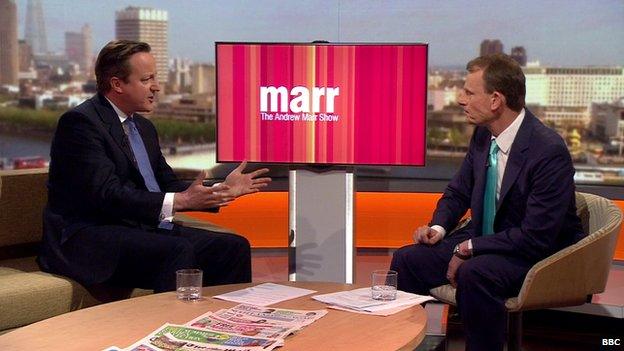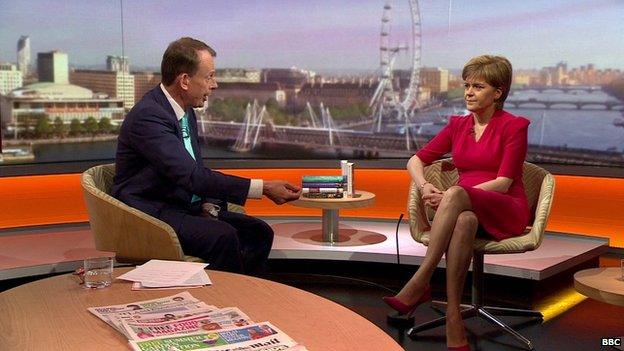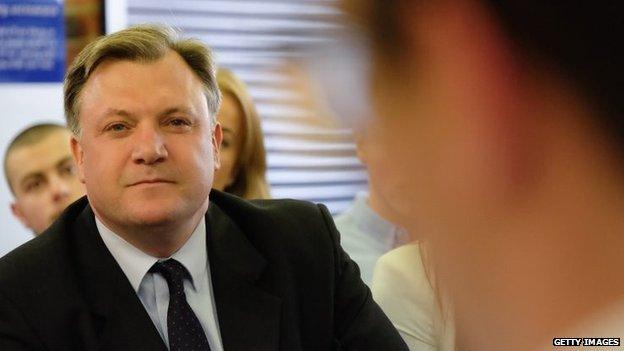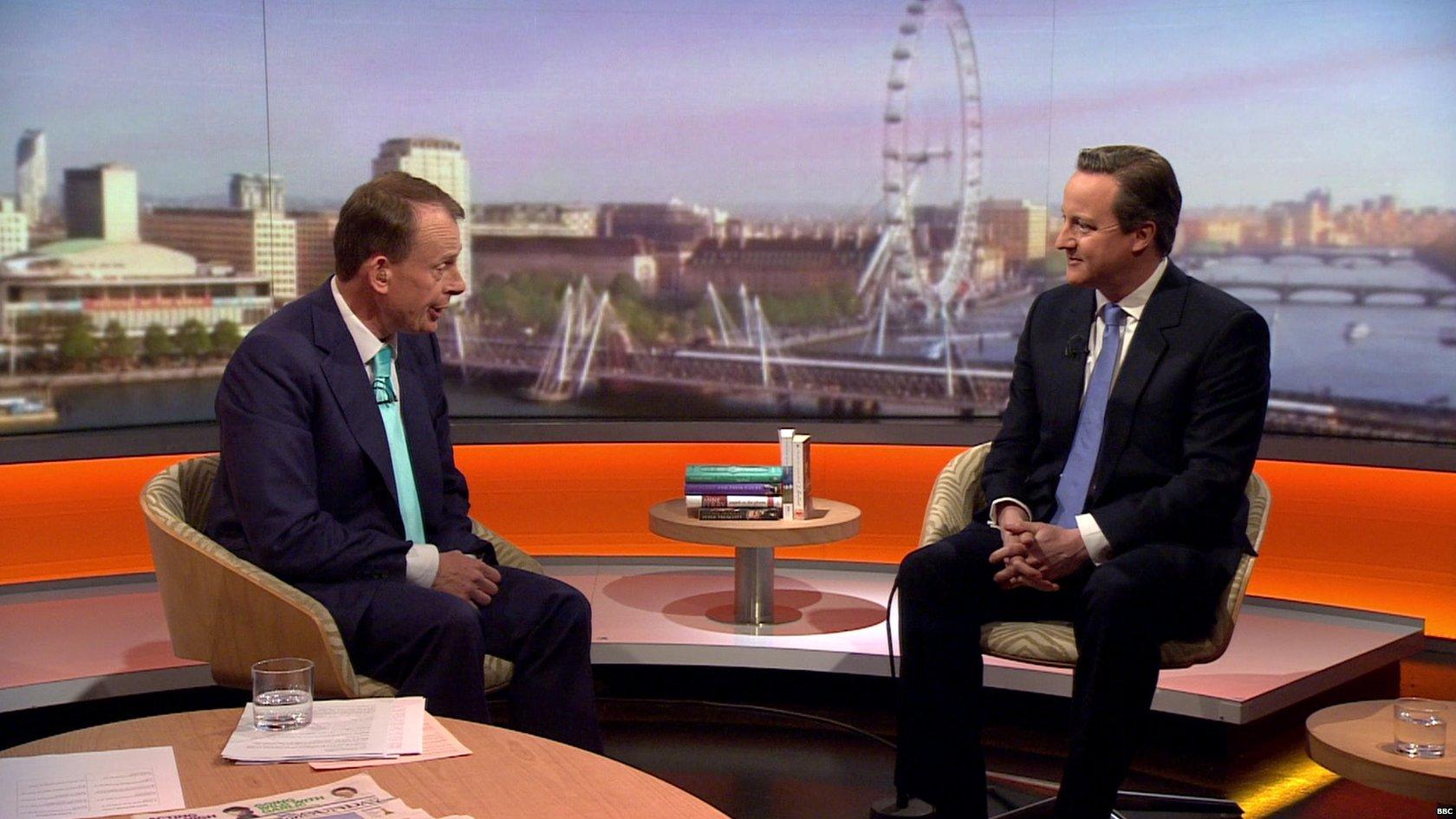SNP 'would be constructive force' at Westminster
- Published
Nicola Sturgeon says she would not do a post-election deal with David Cameron "under any circumstances"
Scottish National Party leader Nicola Sturgeon has dismissed David Cameron's claim that they would be "coming to Westminster to break up our country".
The Conservative leader told the BBC the idea of SNP influence over a Labour PM was a "frightening prospect".
But Ms Sturgeon said the SNP "want to be constructive, to get better politics coming out of the Westminster system".
Labour's Ed Balls said the Tories and SNP wanted each other to do well. "They are in bed together," he told Sky News.
The possible role of the SNP in a post-election government has been one of the key issues in the campaign so far.
'Break-up country'
Labour has rejected the idea of a coalition or deal with the SNP - who are threatening to take a swathe of seats from them in Scotland, if opinion polls turn out to be accurate.
But the Conservatives have demanded that Labour also rule out any prospect of operating as a minority government and relying on SNP support on a vote-by-vote basis.
The SNP have said that they would seek to prevent a Conservative government and would seek to ensure any Labour government was "progressive".
SNP deputy leader Stewart Hosie told the BBC's Sunday Politics the party would vote against "cuts that we didn't like", highlighting the SNP's opposition to the Trident nuclear weapons system.
In the absence of a five-year deal, he said: "There would be no deal so we would be perfectly at liberty to table amendments to Budgets and legislation, vote against or table amendments to estimates, perfectly sensible."

Earlier on the Andrew Marr Show, Mr Cameron said: "The SNP is a party that doesn't want to come to Westminster to contribute to a government; it wants to come to Westminster to break up our country.
"When you have a group of Nationalists that want to be involved with the government of a country which they don't want to belong to you have to ask yourself if you're a voter in England, or Wales, or Northern Ireland would these people care at all about what happens in my life and my constituency? The answer is 'no'."
Ms Sturgeon rejected the view the SNP would attempt to cause disruption at Westminster to further its goal of independence - while also ruling out any deal with the Conservatives.
She said: "There is an opportunity to build progressive alliances for progressive policies. It is a real rather than a pretend alternative to austerity."

Ms Sturgeon added: "We want to be constructive, to get better politics coming out of the Westminster system.
"As long as Scotland remains part of the Westminster system, it matters to people that we get good decisions out of that system, and I want the SNP to play a positive part in improving politics at Westminster for people right across the UK."
Audiences 'enamoured'
Former SNP leader Alex Salmond said his party had received "thousands of applications from people in England who want to join the SNP" following Ms Sturgeon's performance in the leaders' debates. He said audiences "seemed quite enamoured by the prospect of Nicola Sturgeon's politics having an influence in the House of Commons".
"You have really got to divide the attitudes of the Westminster political establishment from the people of England. The people of England don't think like Westminster politicians," he said.
For Labour, shadow chancellor Ed Balls told Sky the focus on the SNP was a sign of Mr Cameron's "faltering campaign".
"He has nothing to say about a better Britain for working families, so he's talking up the SNP as his last best hope of clinging to power."

Mr Balls said he could say "unambiguously" there would be no coalition between Labour and the SNP.
"Our principle is very clear - the SNP exist - unlike the Lib Dems or, to be fair, UKIP - as a political party to break up the United Kingdom. That's their raison d'etre... I can say to you unambiguously that we're not going to start getting involved in coalitions or deals with a political party that wants to break up the United Kingdom."
He questioned whether Mr Cameron would say the same, adding: "He would love to do a deal with the SNP... the reality is the SNP want the Tories in and the Tories want the SNP to do well. They're in bed together."
Lib Dem leader Nick Clegg, meanwhile, issued a direct challenge to Mr Cameron to publicly rule out a post-election alliance with UKIP, telling him not to treat voters as if they were "stupid" by maintaining the Tories were on course to a majority.
"I have ruled out an alliance with the SNP, I have ruled out an alliance with UKIP, why won't you do the same?" he said.
* Subscribe to the BBC Election 2015 newsletter, external to get a round-up of the day's campaign news sent to your inbox every weekday afternoon.
- Published19 April 2015
